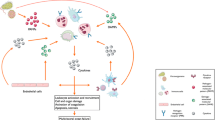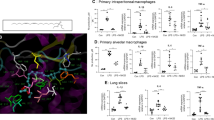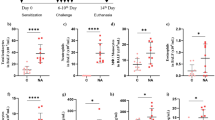Abstract
Purpose
In severe sepsis, functional impairment and decreased numbers of dendritic cells (DCs) are essential reasons for immune function paralysis, secondary organ infection, and organ failure. We investigated the effects of N-acetylcysteine (NAC) administration on protecting lung DCs function in a zymosan-induced generalized inflammation (ZIGI) model.
Methods
ZIGI was initiated in 80 Balb/c mice by intraperitoneal injection of zymosan (ZYM; 900 mg/kg). Mice were divided into 4 groups: (1) SHAM+Vehicle; (2) SHAM+NAC; (3) ZYM+Vehicle; and (4) ZYM+NAC. NAC (100 mg/kg) was administered at different time after ZYM injection. After 48 h, we assessed: lung tissue pathological changes; arterial blood gas values; purified lung DCs surface expressions of MHC-II/I-Ad and co-stimulatory molecules CD80, CD83, and CD86; lung DCs mRNA levels of chemokine receptors CCR5 and CCR7; lung DCs apoptosis; lung DCs ultrastructure by transmission electron microscopy; lung DCs NF-kB transcription factor activity; and LPS-stimulated lung DCs in vitro production of IL-12 and IL-10 were examined.
Results
NAC treatment resulted in: significant improvements in ZYM-induced lung tissue damage and impaired lung function; inhibited lung DCs ZYM-induced increased expression of MHC-II/I-Ad, CD83, and CD86, but not CD80; reduced lung DCs ZYM-induced CCR5 and CCR7 mRNA levels; suppressed ZYM-induced lung DCs apoptosis; ameliorated ZYM-induced lung DCs ultrastructural abnormalities; inhibited ZYM-induced lung DCs NF-κB activity; and enhanced lung DCs production of IL-12 and inhibited their production of IL-10.
Conclusions
Repeated injections of NAC during the early stage of severe sepsis effectively inhibited lung DCs activation and their apoptosis, which could preserve DCs function.









Similar content being viewed by others
References
Barie PS, Hydo LJ, Shou J, Eachempati SR. Decreasing magnitude of multiple organ dysfunction syndrome despite increasingly severe critical surgical illness: a 17-year longitudinal study. J Trauma. 2008;65:1227–35.
Bone RC. Immunologic dissonance: a continuing evolution in our understanding of the systemic inflammatory response syndrome (SIRS) and the multiple organ dysfunction syndrome (MODS). Ann Intern Med. 1996;125:680–7.
Perl M, Chung CS, Garber M, Huang X, Ayala A. Contribution of anti-inflammatory/immune suppressive processes to the pathology of sepsis. Front Biosci. 2006;11:272–99.
Joffre O, Nolte MA, Spirri R, Reis e Sousa C. Inflammatory signals in dendritic cell activation and the induction of adaptive immunity. Immunol Rev. 2009;227:234–47.
Liu YJ. Dendritic cell subsets and lineages, and their functions in innate and adaptive immunity. Cell. 2001;106:259–62.
Efron PA, Martins A, Minnich D, Tinsley K, Ungaro R, Bahjat FR, Hotchkiss R, Clare-Salzler M, Moldawer LL. Characterization of the systemic loss of dendritic cells in murine lymph nodes during polymicrobial sepsis. J Immunol. 2004;173:3035–43.
Scumpia PO, McAuliffe PF, O’Malley KA, Ungaro R, Uchida T, Matsumoto T, Remick DG, Clare-Salzler MJ, Moldawer LL, Efron PA. CD11c+ dendritic cells are required for survival in murine polymicrobial sepsis. J Immunol. 2005;175:3282–6.
Benjamim CF, Lundy SK, Lukacs NW, Hogaboam CM, Kunkel SL. Reversal of long-term sepsis-induced immunosuppression by dendritic cells. Blood. 2005;105:3588–95.
Tinsley KW, Grayson MH, Swanson PE, Drewry AM, Chang KC, Karl IE, Hotchkiss RS. Sepsis induces apoptosis and profound depletion of splenic interdigitating and follicular dendritic cells. J Immunol. 2003;171:909–14.
Hotchkiss RS, Nicholson DW. Apoptosis and caspases regulate death and inflammation in sepsis. Nat Rev Immunol. 2006;6:813–22.
Hardaway RM. A brief overview of acute respiratory distress syndrome. World J Surg. 2006;30:1829–34.
Wesche DE, Loma-Neira JL, Perl M, Chung CS, Ayala A. Leukocyte apoptosis and its significance in sepsis and shock for the treatment of sepsis. J Leukoc Biol. 2005;78:325–37.
Kelly GS. Clinical applications of N-acetylcysteine. Alternative Med Rev. 1998;3:114–27.
Ozdulger A, Cinel I, Koskel O, Cinel L, Avlan D, Unlu A, Okcu H, Dikmengil M, Oral U. The protective effect of N-acetylcysteine on apoptotic lung injury in cecal ligation and puncture-induced sepsis model. Shock. 2003;19:366–72.
Paterson RL, Galley HF, Webster NR. The effect of N-acetylcysteine on nuclear factor-κB activation, interleukin-6, interleukin-8, and intercellular adhesion molecule-1 expression in patients with sepsis. Crit Care Med. 2003;31:2574–8.
Suter PM, Domenighetti G, Schaller MD, Laverrière MC, Ritz R, Perret C. N-acetylcysteine enhances recovery from acute lung injury in man. A randomized, double-blind, placebo-controlled clinical study. Chest. 1994;105:190–4.
Liu DD, Kao SJ, Chen HI. N-acetylcysteine attenuates acute lung injury induced by fat embolism. Crit Care Med. 2008;36:565–71.
Verhasselt V, Vanden Bergh W, Vanderheyde N, Willems F, Haegeman G, Goldman M. N-acetyl-L-cysteine inhibits primary human T cell responses at the dendritic cell level: association with NF-kB inhibition. J Immunol. 1999;162:2569–74.
Wolman TJ, Hendriks T, Goris RJ. Zymosan-induced generalized inflammation: experimental studies into mechanisms leading to multiple organ dysfunction syndrome. Shock. 2005;23:291–7.
Goris RJ, Boekholtz WK, van Bebber IP, Nuytinck JK, Schillings PH. Multiple organ failure and sepsis without bacteria: an experimental model. Arch Surg. 1986;121:897–901.
Cuzzocrea S, Genovese T, Mazzon E, Esposito E, Crisafulli C, Di Paola R, Bramanti P, Salvemini D. Fumonisin B1 reduces the development of multiple organ failure induced by zymosan in mice. Shock. 2009;31:170–7.
Genovese T, DiPaolo R, Catalano P. Treatment with a novel poly(ADP-ribose) glycohydrolase inhibitor reduces development of septic shock-like syndrome induced by zymosan in mice. Crit Care Med. 2004;32:1365–74.
Masten BJ, Gwyneth K, Kusewitt DF, Lipscomb MF. Flt3 ligand preferentially increases the number of functionally active myeloid dendritic cells in the lungs of mice. J Immunol. 2004;172:4077–83.
Menezes SL, Bozza PT, Castro Fario Neto HC. Pulmonary and extrapulmonary acute lung injury: inflammatory and ultrastructural analyses. J Appl Physiol. 2005;98:1777–83.
Ritter C, Andrades ME, Reinke A, Menna-Barreto S, Moreira JC, Dal-Pizzol F. Treatment with N-acetylcysteine plus deferoxamine protects rats against oxidative stress and improves survival in sepsis. Crit Care Med. 2004;32:342–9.
Spapen HD, Diltoer MW, Nguyen DN, Hendrickx I, Huyghens LP. Effects of N-acetylcysteine on microalbuminuria and organ failure in acute severe sepsis. Chest. 2005;127:1413–9.
Xin J, Lin W, Wu HS, Zhang L, Wang CY, Tian Y, Zhang JH. N-acetylcysteine inhibits activation of toll-like receptor 2 and 4 gene expression in the liver and lung after partial hepatic ischemia-reperfusion injury in mice. Hepatob Pancreat Dis Int. 2007;6:284–9.
Kroening PR, Barnes TW, Pease L, Limper A, Kita H, Vassallo R. Cigarette smoke-induced oxidative stress suppresses generation of dendritic cell IL-12 and IL-23 through ERK-dependent pathways. J Immunol. 2008;181:1536–47.
Wen HT, Hogaboam CM, Gauldie J, Kunkel SL. Severe sepsis exacerbates cell-mediated immunity in the lung due to an altered dendritic cell cytokine profile. Am J Pathol. 2006;168:1940–50.
Caux C, Ait-Yahia S, Chemin K. Dendritic cell biology and regulation dendritic cell trafficking by chemokines. Springer Semin Immunopathol. 2000;22:345–69.
Kriehuber E, Bauer W, Charbonnier AS, Winter D, Amatschek S, Tamandl D, Schweifer N, Stingl G, Maurer D. Balance between NF-kappaB and JNK/AP-1 activity controls dendritic cell life and death. Blood. 2005;106:175–83.
Ouaaz F, Arron J, Zheng Y, Choi Y, Beg AA. Dendritic cell development and survival require distinct NF-kappaB subunits. Immunity. 2002;16:257–70.
Acknowledgments
This study was supported by grants from the National Natural Science Foundation (Project No. 81000848) of China and the Capital Health Research and Development of Special of China (Project No. 2011-5002-01 and No. 2011-5002-02).
Author information
Authors and Affiliations
Corresponding author
Additional information
Hong-Wei Wang and Wen Yang contributed equally to this work.
Rights and permissions
About this article
Cite this article
Wang, HW., Yang, W., Lu, JY. et al. N-acetylcysteine Administration is Associated with Reduced Activation of NF-kB and Preserves Lung Dendritic Cells Function in a Zymosan-Induced Generalized Inflammation Model. J Clin Immunol 33, 649–660 (2013). https://doi.org/10.1007/s10875-012-9852-3
Received:
Accepted:
Published:
Issue Date:
DOI: https://doi.org/10.1007/s10875-012-9852-3




